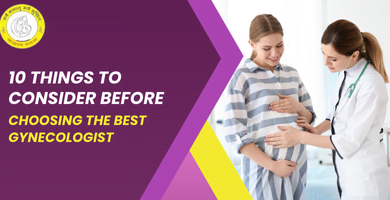How to Deal with High Risk Pregnancy?

Many emotions and experiences can be experienced during pregnancy. Each pregnancy is different. Women need to know their body type to identify potential issues and risks that may arise during pregnancy. Some women might be pregnant with a high risk pregnancy right from the beginning.
In this Article
What Defines a High-Risk Pregnancy?
It refers to any pregnancy with higher health risks for the mother, the baby, or both. High-risk pregnancies can be caused by underlying conditions that may have been present during pregnancy. Even though you are in high-risk categories, it is essential to get prenatal care early and consistently. A high-risk pregnancy occurs when the mother is under 17 or over 35 years old. High-risk pregnancy could include multiple children, high blood pressure, or diabetes.
High-risk pregnancies are more likely to result in premature birth or health problems for the mother and child. This pregnancy can lead to more complications. Thus, special care from the best gynecologist ensures the safety of the mother and the child.
Key Strategies for Managing a High-Risk Pregnancy
1. Prioritize Essential Prenatal Care
Our body requires more nutrients while pregnant to help your baby grow. Prenatal vitamins and supplements can provide you with the folic acid, iron, calcium, protein, and iron you don’t get from your regular diet. Discuss your nutritional requirements with Doctor It’s a good idea to start taking prenatal vitamins before birth if you are planning on getting pregnant.
2. Build a Strong Support Network
During this time, surround yourself with friends and family to support you and help you communicate your needs. You may need to make lifestyle adjustments depending on your health. A trusted team of medical professionals will be there to help you throughout your pregnancy. You might also consider joining a high-risk pregnancy support group to share your feelings and concerns in a safe environment.
The Society for Maternal-Fetal Medicine maintains a list of support groups for different types of pregnancies. Many Facebook groups are available for women who are experiencing high-risk pregnancies.
3. Listen to Your Body’s Signals
Your body is a source of wisdom. Listen to your body. Take the time to slow down. Allow yourself to rest if you feel the need. You may find that you don’t have the energy you used to due to your body working overtime to produce a fetus. If you feel something is not normal, contact your doctor immediately.
4. Avoid Harmful Substances
The baby’s health can be affected by alcohol consumption, smoking, and other tobacco products. Smoking cigarettes can cause low birth weight babies. Congenital disabilities can be caused by the misuse or illegal use of prescribed drugs. Do not self-medicate during pregnancy.
5. Focus on Mental Wellbeing
It is essential to have outlets for stress reduction and thoughts that don’t trigger anxiety, especially if you are experiencing pregnancy problems. Your overall well-being will be improved if you are calm and relaxed. No matter how serious the situation may seem, it is essential to make time for things that you love or allow you to relax. You could go for a walk with your friend, listen to a meditation app, or take a class in yoga. These activities can help you feel normal again and eliminate all your worries.
6. Maintain a Balanced Weight
Pregnancy can be complicated by being overweight or obese. A healthy weight before you get pregnant will reduce your chances of complications. To lose weight and keep it off, eat a healthy diet. Following your doctor’s weight gain guidelines is essential to ensure healthy delivery and labor.
Managing Pre-Existing Conditions During Pregnancy
Pre-existing medical conditions such as high blood pressure, heart disease, and diabetes can impact pregnancy. The body’s changes can exacerbate certain infections during pregnancy. To ensure no complications, consult an obstetrician or your regular doctor.
Can You Prevent a High-Risk Pregnancy?
Some factors that place you in high-risk pregnancy categories can be avoided. Some elements can be avoided, but others cannot. You can’t usually prevent medical conditions that you have before getting pregnant.
To lower your chances of complications, you can address specific lifestyle issues, like smoking and drinking alcohol. Talk to a healthcare professional if you are thinking of getting pregnant but know that you have risk factors you can control. The healthcare professional suggestions about lifestyle changes will improve your chances of having a more uncomplicated pregnancy.
Read the next article: What Are the Most Common Causes Of Female Infertility?
Conclusion
Receiving a high-risk pregnancy diagnosis can be scary for any woman, but it’s important to remember that there is hope. By staying informed about your pregnancy and health, you can take steps to prevent severe consequences.
One of the most critical steps is to schedule regular visits with your doctor and to meet with specialists as needed. It’s also crucial to notify your healthcare team of any concerns or new symptoms that arise. This can reduce the risk of developing complications during pregnancy.
If you’re looking for a knowledgeable and experienced infertility specialist, to book an appointment with Dr. Rashmi Prasad, please click here.
FAQs
What are the warning signs of a high-risk pregnancy?
Symptoms like vaginal bleeding, severe headaches, or decreased fetal movement warrant immediate medical attention.
How does maternal age affect pregnancy risks?
Women under 17 or over 35 face higher risks of complications like preterm labor or gestational diabetes.
How can you control high-risk pregnancy?
While you can’t always prevent a high-risk pregnancy, you can effectively manage it through close monitoring, following medical advice, and adopting a healthy lifestyle.
Causes of high-risk pregnancy
High-risk pregnancies can be caused by various factors, including maternal age, pre-existing health conditions, pregnancy complications, and lifestyle factors.



